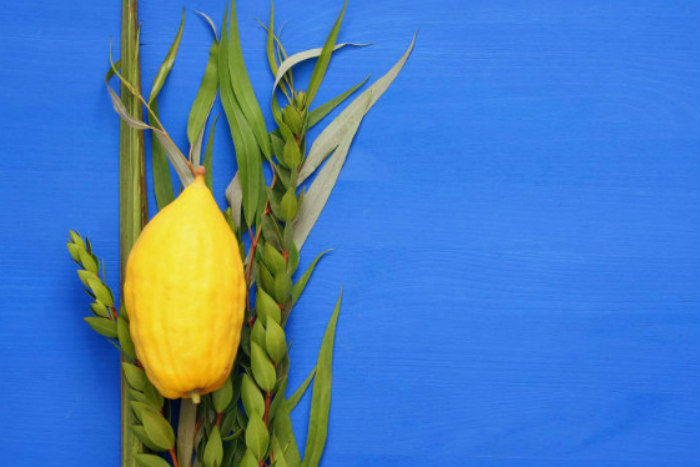
While all Jewish holidays serve as great opportunities to practice audacious hospitality, Sukkot has always stood out to me as the most audaciously hospitable of Jewish holidays. What other time of year do we build a temporary makeshift house through the commandment of inviting ushpizin (guests), with the goal of inviting others into it and dwelling together as a community?
In addition to the sukkah itself, we can find similar imagery of audacious hospitality in the arba minim, the “four species” associated with Sukkot: citron, palm, myrtle, and willow. These symbols can, in fact, exemplify our commitment to diversity, equity, and inclusion, as each one is unique in its own right but stronger when bound together as a whole.
The functions of the four species are defined by both their smell and taste, or lack thereof, along with some interesting imagery from the Midrash (Vayikra Rabbah 30:12):
- The has both taste and smell, representing people who both perform good deeds and have Torah (knowledge).
- The has taste but no smell, representing those who do not use their knowledge to perform good deeds.
- The hadass (myrtle) has smell but no taste, representing those who perform good deeds but lack the knowledge to excel at them.
- The aravah (willow) has no taste and no smell, representing those who lack both.
Instead of shaming the other three species for not being as righteous or wise as the etrog, God instead commands us to “bind them all together [into] one grouping” (Amos 9:6) so they may atone for one another. In other words, no matter how many good deeds a person performs, no matter how wise they are or where they are in their learning and growth as a Jew, everybody has something to offer – and everyone is welcomed, equally and together, into the whole of the community.
I can’t help but think about how this translates into implementing audacious hospitality in our synagogues. Each of us is in a different stage of our journeys as Jews, including our journey to create more diverse, inclusive and welcoming communities; the same is true of our congregations.
Some of us, like the etrog, have lots of experience and wisdom. Maybe we’ve been doing inclusivity and anti-bias work for years and have an ever-evolving knowledge when it comes to dismantling inequality and establishing equitable practices in our institutions.
Some of us, like the lulav, may be well-versed in history, knowledgeable of inclusive language, and familiar with race and queer theory, but haven’t really put any of it to use.
Some of us, like the hadass, may go out of our way to be kind toward people of different backgrounds but lack a fuller understanding of our (and our institution’s) privileges and implicit biases – and how to truly confront them as an advocate.
Some of us, like the aravah, simply don’t know where to start at all.
And yet, despite all these differences, each of us has something to offer.
The lulavim among us can learn how to put our knowledge into action; how to use our wisdom to think outside the box to make our communities more welcoming.
The hadassim can learn how to make our impact match our intent by learning, reflecting, and growing in our inclusivity work.
The etrogim, even with our knowledge and good deeds, can both teach others and also see our past selves reflected in them.
And the aravot among us – those of us who are just beginning our journeys to any form of audacious hospitality work – can both learn from everyone else and remind them that we all had to start somewhere, that we as Jews do not progress by shaming one another but by lifting one another up.
All of us – no matter which of the four species we most closely identify with – has something to learn and to offer. When we come together, when we take each of our skillsets, each of our stories and experiences, each of our gifts and flaws and combine into one unified force dedicated to , we become something bigger than we could have ever anticipated.
Want to begin your journey toward being audaciously hospitable? Start with one of the many articles on our site, including "Diversity, Inclusion, and Equity: What Are They and Why Do They Matter to Us?" by April N. Baskin, "Microaggressions vs. Microaffirmations: Welcoming Others at the 'Micro' Level" by Chris Harrison, and "5 Ways to Be an Ally to People with Disabilities" by Jordan Dashow.
